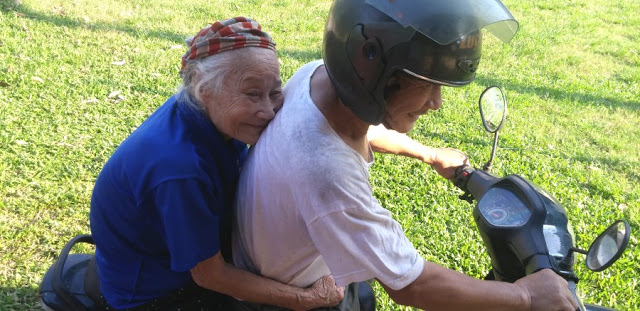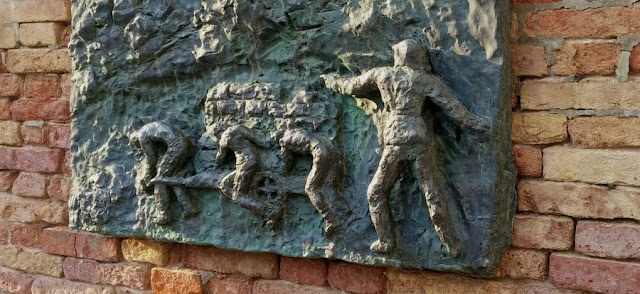Hello, Wilson.
Yeah, I know. It's been seven months since I wrote last time. You may recall that, back in May, I told you I hoped to distribute more futbols in the fall. Well, that didn't happen. There was a small impoverished country that could have used them. Amazingly, it had a Special Olympics school, so I planned to take 10 there, and another 10 to an ordinary school that quite likely would have been short of supplies.
The United States has been squeezing this country for more than 50 years, and I thought they could put up with a little One World Futbol love, but the Tweeter in Chief decided to reverse policy and limit travel there.
Yeah, that's right. I wanted to take 20 One World Futbols to Cuba, study Spanish there for a month and share what life is like there on the ground. Well, it may yet happen. But in place of Cuba, I have two other target countries lined up for 2018, and if those plans come to pass, I'll share them with you.
Meanwhile, I am in Nuemberg with my son and his wife for the holidays. I traveled part-way alone, and It's been an experience. I have learned so much.
For example, I have learned that, if you're not going to take a debit card, you better at least have currency ahead of time. It was easy picking up Swiss Francs at the Zurich airport, but later on, currency became a problem and I'll tell you about that in a bit.
And it wan't so easy figuring out where my Zurich AirBnB was when I got off the bus at the indicated stop. So I slipped into a bar near the stop, buying a beer and listening to the locals chatter for a while. Then I asked the woman who had mentioned Mexico whether she spoke English, and she did, a little. She pointed out the direction to the gas station situated near the AirBnB and then asked me what I thought of -- well, you know who she was talking about. She made that little finger flick off the chin that Europeans make to indicate disgust, or whatever, and I walked off to the AirBnB, where I spent another day before heading off to Munich.
Arranging the trip to Munich involved returning to the airport and taking a city train to the main train station, Zurich HB, -- which was enormous. I took time to stroll along the River Limmat, the outlet of Lake Zurich which flows through town. Before I left the station, however, I wondered: I have enough trouble remembering where I parked my Honda last night on Capitol Hill. How do people find their bicycles after they've parked them at Zurich HB?
 |
The bicycles of Zurich HB
|
 |
The homes seem to rise right out of the River Limmat.
|
 |
Bread, cheese, wine: $35
|
While I was taking in the sights, I also was in search of some famous Swiss fondu. The Swiss aparently invented fondu for those cold nights when it was just too chilly go to out and kill something for supper. I ended up at Swiss Chuchi (Swiss Kitchen), expecting the experience of my life. But it was $35 for cheese and bread fondu with a glass of wine, and I think they make it just as good in Seattle. Filling, though.
I had difficulty finding Swiss Chuchi by the nature of the streets on the hill beside River Limmat. I stopped into a shop and a young woman told me it was down the way in a building with an unmissable landmark: A blue cow:
 |
I had walked right past Swiss Chuchi without noticing it. This landmark made it easy.
|
Bus protocol
There's a procedure for taking the bus in Europe. There are machines to purchase tickets and other machines to stamp the ticket when you start using it. Silly me, I thought I could simply give the driver the money and he would print out the ticket there. Which he could have done. But he wanted the ticket. That caused a lot of confusion, because the bus was already in motion. I didn't know they had the ticket machine right on the bus. Finally he let me pay cash and I had the good fortune of sitting next to a former travel agent who had been to New York and spoke English, and who told me we had arrived at my stop. Which was very helpful, because it doesn't look the same when you come from the opposite direction. At night. And after a couple minutes, I realized I was walking in the wrong direction after getting off the bus. In the dark. In a strange city.
The next day I came within 5 minutes of missing my four-hour bus ride to Munich. The pickup point was a spot called "Silquai" and I stood around the stop, feeling uneasy, but I managed to ask whether I was at the right stop, and the friendly local said I wanted Carpark Silqluai, which was 100 yards away -- the place where this big green bus was just departing. By the time I got there it was departure time and the bus that was almost gone wasn't mine. That could have been bad.
 |
A street name and address
|
Munich proved more of a challenge. The bus didn't stop at the main station, and obtaining clear directions in English to my new AirBnB was difficult. I elected to take a cab: Euros 19.5 via Mastercard (The bus ticket from Zurich to Munich had only been $25.) When the cab dropped me off I wondered whether it was the right location.
Street addresses aren't always easy to see. But the cabbie had it right, and Max, my host, was ready for me. That night I went out for dinner and found out that I should have gotten some Euros ahead of time. I had finished my chicken curry. When I called for the bill was when I learned they didn't accept plastic. But they did accept greenbacks. Price: $26. That seemed a little high, and he ran the conversion rate again, putting the price closer to $17-18 US. Lacking the exact amount, I paid $20 and got a 2-Euro coin in change.
 |
My $17 chicken curry disk (a large beer came with it). I didn't eat the cilantro. I hate cilantro.
|
But the next day, when I wanted to take the bus to the Ostbahnof (East Rainway Station) to purchase my tickets for Nurembeg, I learned that Bus 54 required a payment of Euro 2.70. My coin wasn't enough.
I gave up on trying to find a bank on the curving streets near the AirBnB I Googled a walking map on my laptop; wrote down the street names and the right-and-left turns and headed out, trying to understand the many signs along the way, such as the one immediately below. It appears to be some sort of warning about terrible fiery smells, although I didn't detect any:
 |
Strange -- I didn't smell anything.
|
There were a lot of really classy old buildings. In the picture below, and from the way the onion dome has really settled, I'm guessing this must be one of the older ones.
 |
I think normally the onion domes are quite round. Age does that, I guess.
|
Most of the bikes in Germany seem pretty healthy. I think this must be what people do with them when they die. I saw more than one of these yellow bikes abandoned on their handle bars. Wonder what happened to this one?
 |
I'm guessing that this was a rental that was left for dead.
|
This bike for transporting toddlers seemed to be in a lot better shape:
Did you know that German streets sometimes just hide? I lost my way when I couldn't find one, but then I stumbled across another one on my route --Pirnzregetenpl--as well as a couple young men who showed me how to find my next right turn at Niger Strasse -- because they had Google maps. And they showed me how to use it on my smart phone. Doh!
At the Ostbahnof, I was able to find a Western Union Station, where I purchased Euros with two $100 bills. They gave me Euros 142 in change; that involved an exchange rate of .75 and a fee. (Later, when I got back to the AirBnB I Googled Western Union's exchange rate, which was .85. Say, what?!?! But who ya gonna call?)
Time to eat. I found myself a high protein meal at the Ostbahnof by following the Rick Steves principal of eating where the locals eat: Burger King. That's a photo of my meal, below. You'll notice that the Pepsi wasn't filled to the top. What you can't see is that it also tasted very flat.
 |
My high protein Double Whopper complete with fries and Pepsi flat.
|
I suspect that, due to the crowding on the trains, trams and buses, the German government is promoting lower carbonation in the cola drinks to prevent the swallowing of volitile gases, under a new policy called nichtderfahrt.
Well, that's enough for today. I'm sure I'll have more to share. I'll be spending Christmas in Venice.
Love to everyone.
Robert


























































